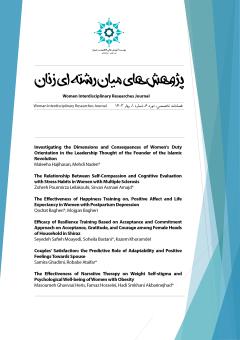-
-
List of Articles
-
Open Access Article
1 - Investigating the Dimensions and Consequences of Women's Duty Orientation in the Leadership Thought of the Founder of the Islamic Revolution
Malihe Hajihasan Mahdi Naderi -
Open Access Article
2 - The Relationship Between Self-Compassion and Cognitive Evaluation with Stress Habits in Women with Multiple Sclerosis
Zohreh Pourmirza Leilakouhi Sirvan Asmaei Amajd -
Open Access Article
3 - The Effectiveness of Happiness Training on, Positive Affect and Life Expectancy in Women with Postpartum Depression
g b Mozhgan bagheri -
Open Access Article
4 - Efficacy of Resilience Training Based on Acceptance and Commitment Approach on Acceptance, Gratitude, and Courage among Female Heads of Household in Shiraz
Seyed Safiyeh Moaiydee Soheila Bastani kazem khorramdel -
Open Access Article
5 - Couples' Satisfaction: the Predictive Role of Adaptability and Positive Feelings Towards Spouse
Samira GHadimi Robabeh Ataee far -
Open Access Article
6 - The Effectiveness of Narrative Therapy on Weight Self-stigma and Psychological Well-being of Women with Obesity
Masoumeh Ghavvasi Heris Farnaz Hosseini hadi AkbariNejhad
-
The rights to this website are owned by the Raimag Press Management System.
Copyright © 2017-2025







